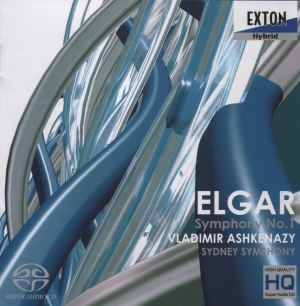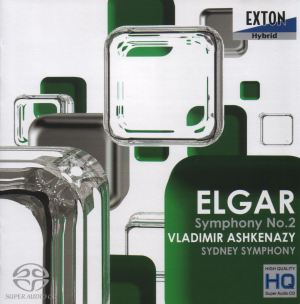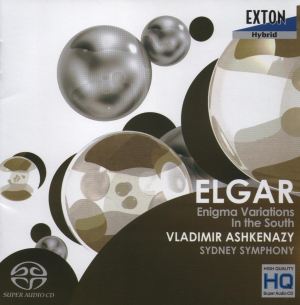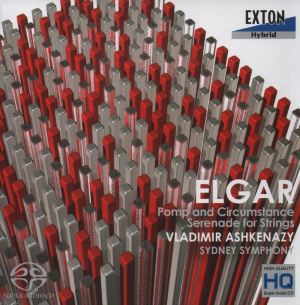 |
 |
| 

alternatively
CD: MDT
AmazonUK
AmazonUS |
Sir Edward ELGAR
(1857-1934)
Symphony No 1 in A flat major, Op. 55
 Sydney Symphony/Vladimir Ashkenazy
Sydney Symphony/Vladimir Ashkenazy
rec. session and live, 31 October and 3 November 2008, Concert Hall
of the Sydney Opera House. DDD
 EXTON
EXTON  EXCL-00027 [52:20]
EXCL-00027 [52:20]  |


alternatively
CD: MDT
AmazonUK
AmazonUS |
Sir Edward ELGAR (1857-1934)
Symphony No 2 in E flat major, Op. 63
 Sydney Symphony/Vladimir Ashkenazy
Sydney Symphony/Vladimir Ashkenazy
rec. session and live, 7-8 November 2008, Concert Hall of the Sydney
Opera House, DDD
 EXTON
EXTON  EXCL-00028 [55:06]
EXCL-00028 [55:06] |


alternatively
CD: MDT
AmazonUK
AmazonUS |
Sir Edward ELGAR (1857-1934)
Variations on an Original Theme Enigma, Op. 36 [30:29]
Overture In the South (Alassio), Op. 50 [21:11]
 Sydney Symphony/Vladimir Ashkenazy
Sydney Symphony/Vladimir Ashkenazy
rec. session and live, 12-14 November 2008, Concert Hall of the Sydney
Opera House. DDD
 EXTON
EXTON  EXCL-00029 [51:38]
EXCL-00029 [51:38] |


alternatively
CD: MDT
AmazonUK
AmazonUS |
Sir Edward ELGAR (1857-1934)
Pomp and Circumstance Marches, Op. 39: No 1 in D major
[6:09]; No 2 in A minor [5:49]; No 3 in C minor [6:10]; No 4 in G
minor [5:13]; No 5 in C major [5:58]; No 6 in G minor (completed by
Anthony Payne) [7:46]
Serenade for Strings in E minor, Op. 20 [12:20]
 Sydney Symphony/Vladimir Ashkenazy
Sydney Symphony/Vladimir Ashkenazy
rec. session and live, 7-8, 12-14 November 2008, Concert Hall of the
Sydney Opera House. DDD
 EXTON
EXTON  EXCL-00030 [49:25]
EXCL-00030 [49:25] |
| |
Not long ago I reviewed
a set of recordings by these same artists of orchestral music
by Rachmaninov. Those recordings were made during a festival
devoted to Rachmaninov’s music in which Vladimir Ashkenazy
led the Sydney Symphony in 2007. In the following year they
mounted a similar celebration of the works of Elgar and the
present recordings were set down then. As with the Rachmaninov
set, the recordings are described as “session and live”
so it’s not to clear just how much editing has gone on.
One other characteristic that the two series of recordings share,
I’m afraid, is that Exton have issued CDs that offer somewhat
short playing time. On the other hand, unlike the Rachmaninov
recordings, these Elgar discs are available separately, allowing
collectors to pick and choose.
Recently I saw a most interesting television film entitled Elgar:
The Man Behind the Mask, which I heartily recommend
to those who have not yet seen it. Vladimir Ashkenazy contributed
some short interview clips to the programme, in which his genuine
enthusiasm for Elgar’s music was very evident. He gives
further evidence of his love for Elgar in these performances.
There’s much to admire, for example, in his account of
the First Symphony. I liked the drive and energy he brings
to the second movement while in III he evinces proper feeling
for this noble adagio, yet sensibly he keeps the music on the
move; he’s evidently in sympathy with this noble and eloquent
music. He also does the finale well but I fear his traversal
of the big opening movement strikes me as less successful. The
motto theme is taken quite steadily right at the start and when
it’s repeated on full orchestra you realise that the pacing
is just that bit too stately, especially since Ashkenazy has
the bass line played very firmly. The effect is close to being
portentous. The main allegro is generally satisfactory
though I feel a slightly more fleet tempo would have been advantageous.
The trouble here is that Ashkenazy doesn’t impart quite
enough spring to Elgar’s dotted rhythms, yet it’s
from those very rhythms that so much of the forward impetus
derives. One passage where I felt there was a distinct lack
of surge lies between 10:04 and 10:41 in this performance. While
overall timings don’t always tell the whole story they
are instructive here. Ashkenazy takes 21:17 for this movement
whereas, when I checked three favourite versions in my collection,
I found that Vernon Handley (EMI, 1979) takes 20:27. Mark Elder,
in his recent very fine Hallé version (review)
takes 20:05 while Sir Adrian Boult (EMI, 1976) almost whips
through the movement in 18:39 (review).
I fear that the slightly foursquare reading of the first movement
is something of a drawback to this Ashkenazy recording.
The Second Symphony starts well, with Ashkenazy impelling
the opening pages forward nicely. In fact, the whole movement
comes off well - the somewhat sinister-sounding episode, which
we will encounter again in III, is well handled (from 7:19)
and Ashkenazy also prepares for that section well. The interpretation
of II is convincing: Ashkenazy conveys the elegiac flavour of
the music without overplaying his hand. The Rondo is as urgent
and dynamic as it should be. I have some doubts, however, about
the finale. In the first few minutes I just sensed a slight
want of lift in the rhythms; the music sounds a fraction heavy.
However, the lead-up to the trumpet-capped climax is well managed
and thereafter I found Ashkenazy’s way with the music
satisfying, not least in the wistful coda, which he shapes sympathetically.
The third disc brings the Enigma Variations and Elgar’s
great Straussian showpiece, In the South. The performance
of Enigma is a decent one but for me it never
really quite matches the achievement of an interpreter such
as Barbirolli. He and Boult, though offering very different
perspectives on this great masterpiece, knew through a mixture
of instinct and long experience, how to mould and shape an Elgar
phrase persuasively but without artifice. Ashkenazy, for all
the merits of his performance, isn’t really in that league.
Thus the theme itself and Variation I sound a bit cool and objective.
In III the little interjections by flute and oboe are just a
bit too staccato and, as a result, the music sounds snatched.
On the other hand, Nimrod is noble and straightforward
and all credit to Ashkenazy for that and for not falling into
the trap of playing it as an elegy. However, Variation X is
something of a disappointment; there’s insufficient fire
and drive in the music, especially in the strings’ downward
rushes, which sound anaemic. The finale is quite good but, to
be honest, lacks the essential electricity and grandeur. Overall,
this is an efficient but not inspiring Enigma.
In the South fares better. This is a good, colourful
rendition even if it doesn’t sweep the listener - or this
listener, anyway - off his feet in the way that the best performances
do. In my view those are the ones by Barbirolli (BBC Legends),
Elder (review)
and the incomparable Silvestri (review).
Ashkenazy responds well to Elgar’s various changes of
mood, ensuring that the work is not episodic. The canto popolare
passage is atmospherically done, including a nice dusky viola
solo, and the conductor prepares for this section imaginatively.
One drawback is that there are times, both in this work, and
in Enigma, where the violins sound slightly undernourished,
especially in alt. The final pages, Elgar’s gloriously
ripe coda, are taken just a fraction too steadily for my taste:
the music doesn’t really take off, as it should.
The final disc collects together all five of Elgar’s Pomp
and Circumstance Marches and also Anthony Payne’s
completion of a Sixth march. That’s been recorded before,
at least once - by the indefatigable Richard Hickox (review)
- but to the best of my knowledge this is the first time that
the expanded set of six has appeared together on CD. I’ve
heard the Payne completion before and I have to say that this
recording confirms my agreement with Ian Lace’s judgement,
in his review of the Hickox recording, that, unlike Payne’s
stunningly effective realisation of the sketches for the Third
Symphony, this march adds little to our knowledge and appreciation
of Elgar. As Ian put it, ‘perhaps the sketches were better
left in the archives?’ Quite. Ashkenazy and his players
play the piece with gusto and make as good a case for it as
could be wished.
With the other five marches we are on more familiar territory.
Or are we? In fact, it tends to be the First and Fourth of the
set that are most commonly played and recorded. But the other
three marches are well worth hearing. Number 2 is much less
‘obvious’ than Number 1. The music is more shadowy
and carries ‘uneasy undertones’, in the words of
the booklet annotator. Number 3 is often surprisingly subdued
for a march and swagger is only occasionally experienced. I
think Ashkenazy does all these marches well. I’m delighted
to say that he plays the Big Tune in Number 1 unaffectedly -
how nice to hear this fine melody in the way Elgar intended
it, shorn of any jingoistic connotations! The disc also contains
a well played and affectionately shaped account of the Serenade
for Strings, in which the lovely, hushed central movement
affords particular pleasure.
So, what is one to make of these discs? The first thing to say
is that one can’t help but notice that the discs offer
rather stingy measure in terms of playing time. The documentation
is in English and Japanese and, to be honest, the English notes,
by various authors, are serviceable at best. The recorded sound
is perfectly satisfactory, without being anything special -
I listened in conventional CD format. The key purchasing decision
will revolve around performance standards and the quality of
these interpretations. The Sydney Symphony play well enough
but they don’t outshine orchestras such as the London
Philharmonic and certainly not the current leaders of the pack
in this repertoire, Sir Mark Elder’s Hallé. Ashkenazy
himself is a reliable guide to the music but, to be candid,
I don’t think he has the music in his blood in the way
that conductors such as Barbirolli, Boult, Elder or Handley
do. I doubt that anyone buying any of these discs will be seriously
disappointed but there are several preferable versions of every
one of these works in the catalogue and Ashkenazy doesn’t
disturb existing recommendations.
John Quinn
|
|




 All Nimbus reviews
All Nimbus reviews








